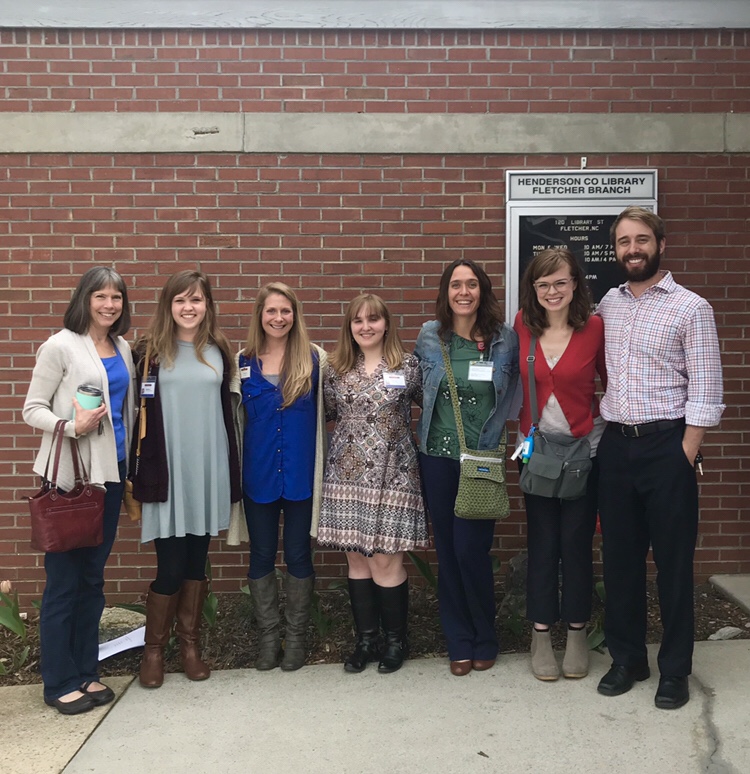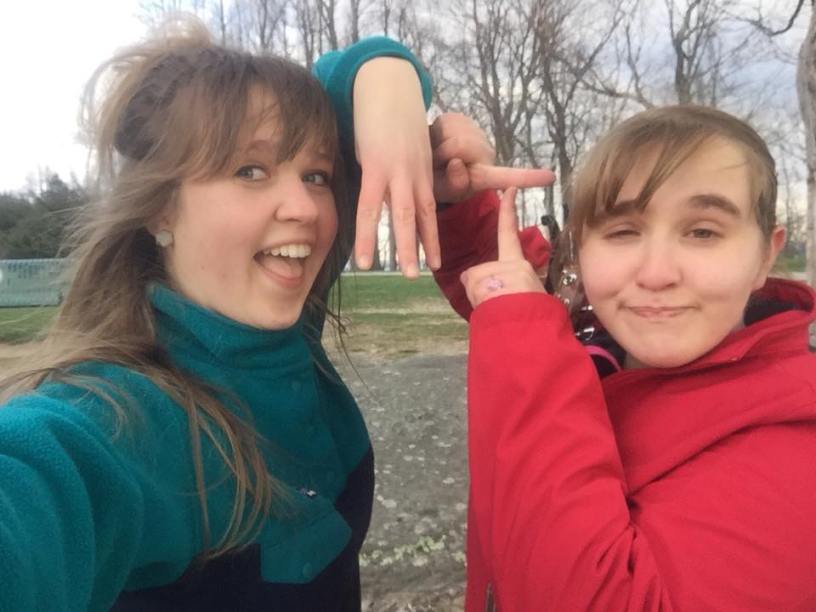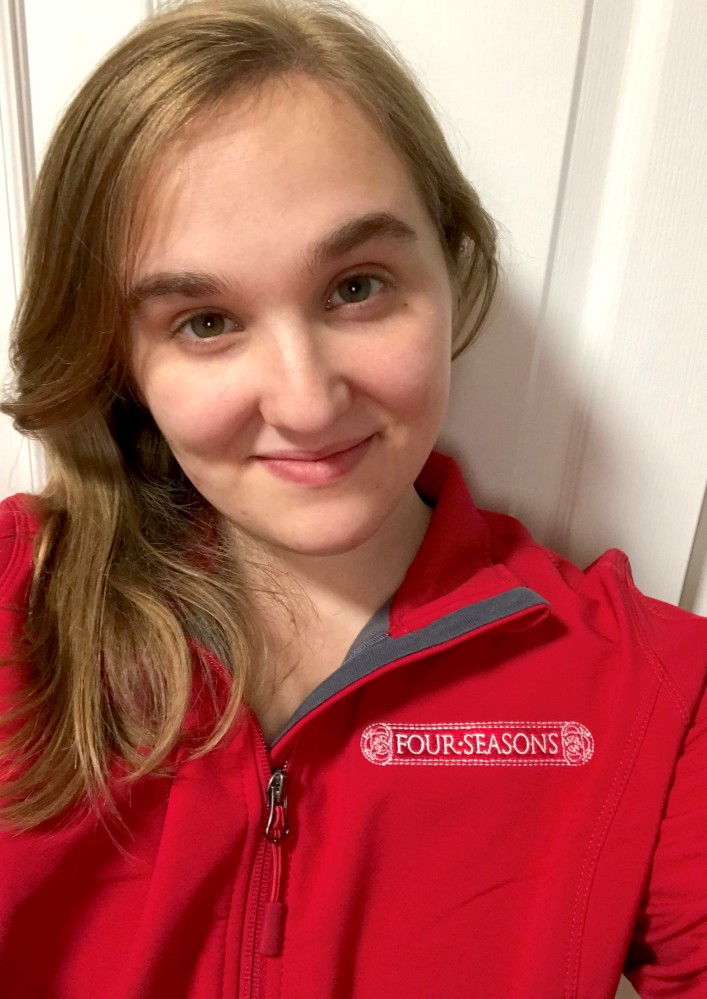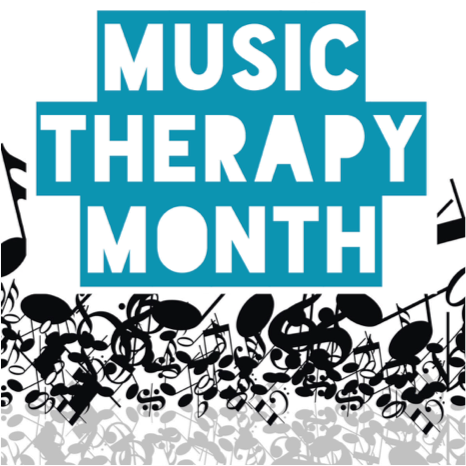It’s hard to believe that eight weeks have already passed since I started my music therapy internship. It’s harder to believe that I’ve been away from home for over two months. Life in North Carolina is moving quickly (just as I had anticipated), but the pace has been exhilarating to experience!
I began my MT internship on October 2, 2017 at “Four Seasons Compassion for Life” in Hendersonville, NC. Four Seasons is a nationally recognized, award-winning, and well-respected hospice and palliative care non-profit. We serve in 11 counties across Western North Carolina, offering a variety of services to patients and loved ones to provide comfort and support. Among these services is music therapy, which I am very honored to be a part of (through April 2018). So far in my time with FS, I have learned more than I ever thought possible in two months. I’ve already experienced what it’s like to work a full week as a hospice music therapist (by myself!), which was crazy exciting and simply confirmed my love for this population. As I’ve integrated into the FS family, I have received unending amounts of support, encouragement, and guidance. When you are in such a positive learning environment, you can’t help but grow as a person and professional every single day. And I have…oh, I have.
Because I don’t want to make this post too long (BECAUSE I LOVE MY JOB AND COULD GO ON FOREVER), I’m going to list some of the most significant things I’ve learned so far as a music therapy intern:
1. Verbal processing can be really challenging in hospice care. Assess yourself too.
Verbal processing is one of the things I came into my internship having the least amount of experience in. I anticipated this to be a huge focus area for me entering into hospice work, but I didn’t realize how difficult it would be! My internship director and I sat down in my second month and I described this challenge to her. “I feel like my patients and families have so much more they’re wanting to say…but I don’t seem to know how to get there with them. I feel stuck when approaching the hard topics.” I brought the same thing up with another Four Seasons MT as well.
My director suggested that I write out a list of questions within three different areas of need: spiritual, symptom management, and bereavement. This would serve as practice for brainstorming potential questions to ask patients and/or loved ones, questions that “dig deeper.” The list helped me reach beyond the overused “How do you feel?” or “What are you thinking?” phrases; However, I still felt hesitant.
The beauty of this internship is having the opportunity to learn from multiple minds, perspectives, and approaches. The five full-time MTs here are simply rockstars! My director helped me get the wheels turning, and the other MT I spoke to helped me explore my hesitancies. I described my concerns about offending someone I’m processing with, or going too far on a topic they aren’t ready to acknowledge. Is it my business to know what someone thinks will happen to them when they die? Is it my place to ask someone how they’re processing their grief? In response, the second MT challenged me to answer all of the questions I had on my list (as if I were the one being asked). Surprisingly, some were really hard to answer.
His point was this: How can we as therapists expect our clients to be vulnerable with us if we are not vulnerable with ourselves? Am I hesitating because I don’t want to make the other person uncomfortable, or am I hesitating because I’m uncomfortable? For me, I acknowledge that it’s a combination of both. Hospice deals with some heavy stuff and it’s hard to articulate what you’re thinking or feeling sometimes (on both ends). That being said…
2. Patients have a right to choose how they feel, what they think, and when to talk about it.
Imagine in the six months you are given to live, you are sick, (often) in pain or discomforted, and left with little independence. Just as your time is limited, you are limited in what you can do for yourself. Can you walk like you used to? Can you breathe without oxygen? Can you manage without comfort medication? Can you take yourself to the bathroom? Can you eat or drink anymore?
This is real life for our patients. They are declining, some slow and others quickly. They are all transitioning through a difficult point of life- the end. But each are their own individual, with individual perspectives and emotions. A person, though dying, is still a person. And no person reacts exactly the same as another during end-of-life.
If we as healthcare professionals automatically assume a patient’s feelings or thoughts, we are taking away the last bit of independence they still have. How they are feeling, what they are thinking, and when they decide to share it with us is theirs. We cannot force vulnerability. What we can do is be present, be genuine, and listen to what the patient is saying (because they’re saying it for a reason!). When patients do open up, we have to choose our follow-up words consciously. Are we validating and supporting where they’re at, or wasting their time? Is what we are saying truly meaningful to the patient?
3. Choose each piece of repertoire intentionally.
Another MT at Four Seasons told me recently that “one song has the power to open up a person’s world.” A patient struggling to breathe may calm and sleep when hearing a familiar, relaxing tune. A family member in denial about their loved one’s death may acknowledge it for the first time with a song they associate with the patient.
While patient-preferred music is really important, it’s our job as music therapists to pick pieces that will elicit response. If the patient prefers hymns and gospel music, we don’t want to simply flip the pages in a hymnal. We want to select specific ones that address the current needs presented, are significant to the patient, and are appropriate in the moment (an upbeat “Down By the Riverside,” for example, may not be the right choice in an actively dying situation…or is it?).
Also another quick note on repertoire selection: singing songs about dying is okay. In fact, the message often paves the way for meaningful discussion with the patient!
4. Crying will happen. It’s okay.
Patients will cry, family members will cry, friends will cry, you will cry. It’s going to happen. Hospice music therapists enter into the worlds of patients and loved ones, who come from all walks of life. We establish a relationship. We share music that the patient cherishes. We discuss their greatest joys, fears, concerns, and limitations. We witness some of the happiest moments they have in hospice, and some of the most heart-wrenching. Hospice music therapy is intimate work…and emotions will arise. As long as the focus remains on the people I’m serving, my tears are not going to impact the therapeutic space or relationship. It shows I am acknowledging the emotion in the room, but more importantly that I am human. We are all human and life is precious. It’s okay for all present at end-of-life to acknowledge that.
5. Professional collaboration and communication is key.
From the moment I started at Four Seasons, I was a part of the team. Every professional I met was glad to welcome me in, each expressing their excitement to work together. Collaborating with an interdisciplinary team is not something you get a lot of experience with as an MT student, so this was new territory for me. Where do I even start? What do I report to them? Do they know what music therapy is?
To say that FS emphasizes teamwork and respect is an understatement. They live it. Everyone is educated about all disciplines, everyone acknowledges each team member as significant, and everyone works together to provide the best care possible. Even as an intern, I feel important and heard by my colleagues.
It’s interesting to look back on my first IDG meeting, when I first observed our teams interacting and making decisions. It was simultaneously overwhelming and amazing how every piece of communication and collaboration seemed to mesh. I didn’t know what to say.
But as I continued and began to see my own patients, I gradually became more involved. I included myself in meetings more, throwing in statements and suggestions that were beneficial to the discussion. I communicated with team members about significant patient updates, and they did the same with me. Before I knew it, I was confidently relaying information and asking questions. I felt like a real professional for the first time, and it was liberating! Through all of this, I have learned that it takes an army to provide the amazing care that our patients receive and deserve. If I am not doing my part, the team and our patients suffer.
6. Plan ahead as much as you can.
Music therapy internship is a full-time job, y’all. For the first time, you are truly experiencing what a day-in-the-life of a music therapist is like…and initially, it can be a lot to take in! You are thrown a bunch of new information while also trying to put together repertoire, maintain a caseload of patients, schedule visits and meetings, update patient charts, communicate with team members, study for the board certification exam, and keep your head from falling off.
I used to consider myself a bad procrastinator, which I know is a terrible habit and incredibly difficult to break. But my internship experience has really helped me shift gears and become more diligent in my work. As a result, I am better maintaining a schedule, keeping track of important details, effectively communicating with colleagues, and feeling on top of things in general. I believe internship would be a heck of a lot more stressful if I was procrastinating. So, MT students approaching internship…plan ahead and make it easier on yourself! The best thing I can suggest is to get your repertoire collection started now (because it’s a huge task), practice working ahead on assignments, and use a planner. These things will only help you in the long run.
Now I find it difficult to not work ahead, imagine that!
7. Scheduling visits with patients is not the easiest; However…
When I found out that I was going to have my own caseload for a week, I attempted to be diligent and call patient caregivers ahead of time (end of the previous week) to schedule home visits. Nine times out of ten, I was asked to call back after the weekend was through. Initially, I was feeling overwhelmed…the first week by myself was approaching and I didn’t even know what my days were going to look like. But as I continued these calls, I began to see the patient and family perspective. And to anyone that has ever been involved during a loved one’s decline, you know exactly what I mean. The patient has a bad day and is up all night, the caregivers are trying to keep track of all the hospice professionals coming to the house, the family is trying to arrange future plans while simultaneously dealing with their own grief…you get the picture. It is exhausting. So while knowing my schedule is important, it is more important that I’m respecting the wishes of my patients and their loved ones.
8. Be confident and kind to yourself. You’re learning (and always will be)!
I had sooo much anxiety approaching the start of my internship. I was not only transitioning into a new period of my life; I was moving far away from my support system. I was terrified and didn’t feel ready.
The night before my first day, I slept maybe three hours. I sat awake in bed contemplating everything I felt unprepared for. But the morning was interesting. As I was getting ready for work, my mindset began to shift. I had already successfully moved to North Carolina and lived on my own for two weeks…and life had continued. This next step would be fine, and so would I. I walked into work on my first day, acknowledging my anxiousness but embracing newfound confidence. Maybe I didn’t know what was going to come, but I was ready. Nobody- especially myself- was going to tell me otherwise.
I’ve had moments of doubt. Moments of homesickness. Moments of “oh crap I don’t know what I’m doing.” But I’ve embraced my entire NC experience (internship and otherwise) as a learning opportunity. I am here to grow in every aspect! So with each day, I am taking risks, asking questions, exploring new territory, meeting new people, and loving all the moments I’ve had here. I am thriving.
9. You will not be an effective music therapist if you do not take care of yourself first.
Self-care is something always preached throughout undergrad, but it’s hard to put into perspective how necessary it is until you’re working as an MT everyday. I experienced this firsthand already.
I’ve done really well with maintaining my emotional self-care. I continue to discover new things everyday that bring me peace after a heavy day. But my physical self-care? A whole other issue. Tightness and chronic back pain has always been a problem for me as a musician, but it became especially unbearable by my second month of internship. On top of seeing patients all week with a guitar strapped to me, I have been working part-time as a care provider on the weekends for an adult who is 100% dependent. The transporting, feeding, toileting, and overall care was overwhelming on my already strained muscles. Long story short, I coughed up $100 for a neuromuscular massage just to find some temporary relief…I was so desperate. Not good considering I’m still a college student with existing expenses.
Now, I pay close attention to any changes I am experiencing (physically or emotionally). The other Four Seasons MT intern and I discussed this at one point, and she described self-care beautifully: “Identify what drains you, and what fills you.” When you are dealing with something that is weighing heavy on you, what do you do that lightens the load? Don’t be afraid to explore new things that calm and enlighten you. It may be something like exercising, meditating, resting, or treating yourself to a manicure or massage (though I don’t recommend the $100 ones, I’m cheap!). In the end, your patients will thank you because you are present and focusing on them during visits.
10. Be present- stop overthinking about the uncertainty of tomorrow.
This one continues to be a big one for me, because I struggle SO MUCH with it. I’m a huge ball of anxiety when I don’t know what’s to come. Let me preface by saying that I have tackled this for many years of my life, and I’ve improved exponentially compared to where I used to be. However, when it comes to big things like A) what state will I live in after internship, or B) will I find a job before I’m done, or C) will I pass my exam to even be allowed to practice MT, all of it consumes my brain.
I’m trying really hard to focus on one day at a time…but the anxiety catches up to me often. I’ve created my own personal home here in North Carolina, and my heart has grown so attached to the idea of staying and planting my life here. What will happen if things don’t work out the way I want them to? The answer is simple (yet so difficult to grasp): I won’t know until that time is here. So in the meantime, I’m trying my best, loving and living my passion, serving others, and trusting my hard work will someday pay off. Everything comes in time.













